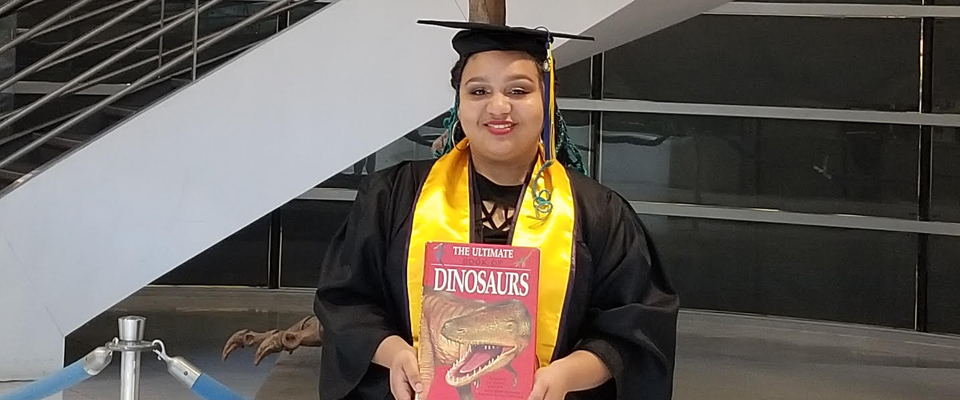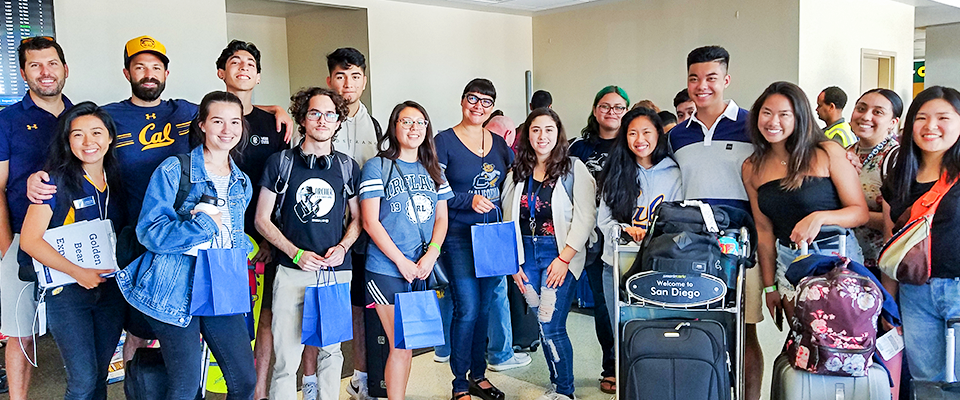by Courtney Cheng ’16
Alexis Williams ’17 knew from the first moment she set her foot on the UC Berkeley campus that she wanted to become a Golden Bear. She had the chance to visit Cal as a high school student through the AVID (Advancement Via Individual Determination) program at her high school, which offered students the opportunities to travel from Southern California to Northern California to tour colleges.
Alexis’s first reaction to Berkeley wasn’t one of awe, but of resignation. “This is one of the top schools,” she recalls thinking. “I don’t think I can get in.” One of Alexis’s teachers “bopped her on the head,” chided her for being so pessimistic, and pushed her to apply. On the way home after her second visit to Cal with AVID, Alexis began to write her personal statement about how important school was to her. “School was something I was good at,” she explains. When faced with regular bullying from her peers, school gave her an escape.
The first draft of her statement moved her teacher to tears. That moment solidified Alexis’s dream of getting into Cal to study geology.
Planning for College by Age Six
Many parts of Alexis’s childhood fed into her Berkeley dreams. One of her earliest memories informed her decision to pursue geology. “There was a rock I had…. I can’t remember picking it up, but I remember carrying it home and coloring on it with a green marker,” Alexis recounts. “I kept it in my drawer, and every time we moved, I never stopped doing that.”

Alexis’s family—her parents, as well as her grandmother—fostered her love for learning and motivated her to persevere through school in the face of obstacles and her peers who bullied her. “I come from a family of tough cookies,” Alexis notes with a laugh. Her grandmother grew up on a plantation in the 50s and 60s and became a single mother at the age of 16. Her father went into the Marines at the age of 18, and her mother always worked while raising three children.
When Alexis was six, already in love with school and set on her decision to go to college, her father bought her an illustrated book about dinosaurs. Unable to read the book on her own at the time, she pointed at sections of it (notably, a drawing of a man lying next to an excavated shoulder blade of a dinosaur), asking her father to read it out loud for her. Alexis was encouraged to remain optimistic and resilient from her parents and grandmother’s nurturing. She says, “I look at [my parents and grandmother] and then I think, ‘I got through that and I got through that…. If I got through all those already, then I’ll probably get through this one, too.’”
Redefining Success at Cal
Alexis was prepared to be self-motivated at college, but Berkeley challenged her academically, mentally, and emotionally. She entered Cal defining success as straight A’s and a 4.0 on her transcript. She wasn’t alone. Many of her peers in the African American Theme Program at her freshman year residence hall thought the same. All of them diligently pushed themselves to work harder, worrying that they were falling behind their peers.
It wasn’t until Alexis and her floormates sat down one night to share their struggles that they realized they had all been anxiously watching each other, fearing they weren’t doing as much as those around them. “This was one of my most liberating moments at Cal,” Alexis says. “The folks who I thought were so great were looking at me, thinking I was great. That was when I realized I was doing okay. Everyone else is in the same boat as me.” They realized that their stress was self-made.
“I come from a family of tough cookies.”
Being honest and vulnerable with her closest friends prompted Alexis to become more open about her challenges and to seek resources from others, including her peers, family, and mentors on campus. Alexis found support from the EOP office, the Tang Center, and the Cal Alumni Association (CAA), from which she also received financial support through The Equity Scholarship, now the Kruttschnitt Aspire Scholarship Program (KASP).
Everyone Alexis sought out for help was more than willing to provide advice, connect her with others who could offer further guidance, or encourage her to feel comfortable and confident on the UC Berkeley campus. “As a first-generation college student, it was so new to talk to so many people with college degrees,” Alexis explains. “From my first phone interview with CAA [for The Equity Scholarship], the staff members made me feel good about myself, even when I didn’t know about certain things.”
Outside of her communities of supportive peers and mentors, however, Alexis felt constant discomfort among other parts of the UC Berkeley campus. “As someone of mixed heritage, I had an interesting time growing up in the first place.” In elementary school, when she was told to draw her family, she “would gather all the crayons…because that was what [her] family looked like.”
Alexis was always comfortable with and proud of her mixed heritage, but Berkeley made it impossible for her to escape the realization of her background. Students proclaiming statements like “I don’t see color,” and the contemporary socio-political setting—including the Occupy movement and the hanging of effigies around campus—deeply unsettled her. In addition, Alexis became even more discomfited by the fact that the last African American student on record to earn a degree in geology from UC Berkeley graduated in 1992, before she was born.
Alexis talked about her experiences with on-campus mentors and friends, many of whom took classes on African American studies and were able to comment on the historical context of present happenings, which helped her process her thoughts and work through her emotions. Although Alexis’s community gave her great comfort and support, lingering discontent continued to sit with her, even after graduation.

Bringing Her Education to Others
Alexis graduated in May 2017, but her continual work to make peace with her emotions from Berkeley is already encouraging her to find ways to make positive changes in her community and for others who share her experiences. Her desire to help others was a seed planted in her by a visit from her grandmother while Alexis was still a student.
During one of these visits, her grandmother caught a glimpse of her physics homework and asked, “What is this chicken scratch?” Alexis remembers with a laugh. Alexis attempted to explain her physics homework to her grandmother by simplifying it, comparing the logic of her homework problems to household chores, like how running hot water on the lid of a tight jar would loosen it and make it easier to open.
“My physics homework is basically asking me, ‘How much does the metal expand when you run the water on it in order for you to open it?’” Alexis summarized. Her grandmother had an epiphany; for the remainder of her visit, she pointed out other instances of “physics” around Alexis’s apartment.
From her interaction with her grandmother, Alexis had her own moment of realization. She could so easily connect her education at Berkeley with her family; the seemingly separate parts of her life weren’t as distant as she’d thought them to be.
Alexis is now finding more ways to share her knowledge—of geology, history, and museums—with others at her internship at the Rosie the Riveter WWII Home Front National Historical Park in Richmond, California. While this role deviates from her former position at the University of California Museum of Paleontology, where she worked more directly with fossils and other organizational duties, Alexis still enjoys the opportunity to apply her passions to educate others together. Each day, Alexis’s work entails engaging with park visitors in a wide variety of ways: acting as tour leader, answering visitor questions about exhibits, and even hosting one-hour programs to discuss the local history from one million years ago to present day.
As for the persistent issues of race and equality, Alexis continues to debate about how she can best address these issues through her work and life decisions. In the next four years, she intends to apply to graduate school to earn a Master’s degree in museum studies, but she also aims to tap into her experiences and find unique ways to support her communities by addressing minority issues in schools. “I already reached out to my mentors at Berkeley, asking them for their advice,” Alexis stated. “I’ve still got time to figure it out, but definitely plan on giving back in the future.”
Learn more about the Kruttschnitt Aspire Scholarship Program (KASP).




















